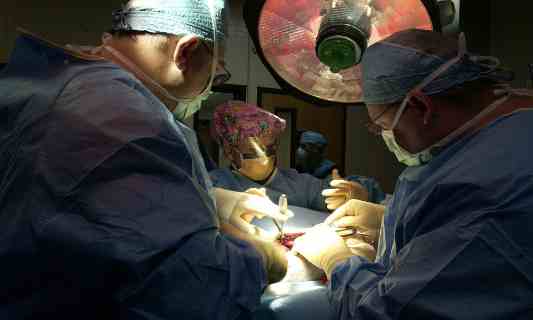General Surgeon
Who Is A General Surgeon?
General Surgeons perform operations or surgical procedures involving various major body parts of the human body such as the gastrointestinal tract, liver, colon, etc. This could be for a transplant, removal or any other healing steps. As a General Surgeon, you will treat your parents through invasive or non-invasive surgeries. Surgeries like the removal of a gallstone or the appendix can be done using a non-invasive laparoscopic method, while major operations like organ removal or transplants are more invasive procedures. Your expertise will help the patient heal and lead a better life!
Roles & Responsibilities
Planning the medical procedure. As a general surgeon, you will study the medical history of the patient, analyse health records and chalk out a procedural plan. You will also consider factors like allergies, medical conditions, etc., before recommending a surgical plan.
Performing surgery. The defining activity of a general surgeon is, of course, the surgery itself. You will perform the planned procedure with a team of fellow surgeons, nurses, anaesthesia staff and other support staff.
Monitoring the patient’s post-operative health. Your role won’t end with surgery. You will have to continue monitoring the patient, advising them on post-operative care and conducting regular follow up sessions to keep tabs on their progress.
Prescribing additional treatment. The surgery you perform might require additional aid such as the use of antibiotics, dietary changes, sedatives, etc., both before as well as after the operation. This helps prepare the patient for the operation and ensuring a speedy recovery after.
Ensuring that the surgical equipment is sterile and functional. Before you begin the surgery, you and your team need to check if the operation theatre and all its equipment are sterile and in perfect condition. While you will have support staff to handle this task, you will need to oversee this part as well and avoid all possibilities of infection during the procedure.
Take the Mentoria career assessment test, to find out how well-suited you are as a Doctor General Surgeon.
Discover your Ideal future
Get expert guidance and mentorship towards your perfect fit.
What Skills Will I Need To Have To Do This Job Well?
As exciting as this sounds, there are some things you’ll need to learn to do the job right:
CRITICAL THINKING
Surgery is a high-pressure activity that often requires you to make split-second, life-saving decisions on the operation table itself. You should be able to think through and alter the course of treatment under stressful situations as and when required. Critical thinking and a calm mind will help you achieve such tasks.
PROFESSIONAL KNOWLEDGE
You should be an expert in surgical procedures and the human body. You should know how to handle surgical tools, which method to adopt for the procedure and predict how the body will react to such processes. An excellent grasp of such concepts could be lifesaving in critical scenarios. It is also important to stay updated on newer techniques and developments in medicine.
METICULOUSNESS
Precision should be your middle name. Your hand-eye coordination, vision, visuospatial awareness and dexterity should be excellent, as this will help you perform even the most complex surgical procedures with ease.
PHYSICAL AND MENTAL FITNESS
Surgeries could get done in minutes or go on for hours. On some days, you will have multiple surgeries lined up. You will need excellent physical stamina and immense concentration to get through your day as a general surgeon.
LEADERSHIP SKILLS
As a surgeon, you will lead teams of medical support staff and junior surgeons in an operation theatre. You will ensure that your team properly follows overall sub-processes within the surgery. For complicated cases, you may have to lead a large team of multidisciplinary specialists. This requires good leadership and organisational skills.
What Will My Workplace Look Like?
As a general surgeon, you will work indoors in a well-lit, sterile environment. Since your primary function is surgery, you will have to stand for long hours. You may even travel between the hospitals where you enrol as visiting staff, clinics and surgery sites unless you choose to operate only at your place of work. Your working hours can be irregular due to emergency requirements. Your workplace may need you to stay “on-call” at all times and work night shifts too.
What Is My Scope For Career Growth As A General Surgeon?
The constant advancement in medical technology has made surgeries more common and less scary, thus increasing the demand for physicians and general surgeons as well. Even suburban and rural areas are seeing a rise in the number of surgeons due to government healthcare initiatives. As a junior surgeon, you will spend your first few years learning techniques firsthand under practiced senior surgeons. Once you gain enough experience and build a reputation, you will be the senior surgeon who leads a team of juniors. You may also choose to set up a private practice, but you would invariably be affiliated with hospitals or other institutes with surgical facilities. You could also work as a visiting staff member at hospitals, where your hours are limited and only extend in cases of emergencies.
Thinking of a career as a Doctor General Surgeon? Take the Mentoria assessment test & talk to our career counsellors to get personalized step-by-step guidance for your future career path.
How Much Will I Get Paid?
The exact number will depend on your reputation and expertise in the profession, but we can give you a general idea.
Seniority matters immensely in this profession. That’s why general surgeons earn anywhere between INR 5,00,000 to INR 36,00,000 per year in India. On an average, a general surgeon in India earns around INR 11,80,000 per year.
Okay, I'm sold. This is amazing

STEP 1: Class XI-XII/Junior College
You should pursue science after Class 10 with a focus on biology.

STEP 2: Graduation
At this stage, you will follow the same path as a doctor or surgeon and enrol for the foundation course of all medical specialisations – an MBBS degree.

STEP 3: Internship/Residency
Every aspiring general surgeon has to undergo compulsory training at a hospital for at least a year and a half. This internship will be a part of your MBBS programme.

STEP 4: Specialisation
After completing your MBBS and getting certified as a doctor, you could choose to specialise as a general surgeon. This requires you to take the entrance test for an MS (Master of Surgery) in General Surgery. This is a 2-3 year course.

STEP 5: Land a Job
Once you complete your MS in General Surgery, you are qualified to apply as a general surgeon.
At this stage, you are a qualified General Surgeon and you can apply for employment in the healthcare institute of your interest.
Sign Up for Mentoria - India’s Most Reliable Career Discovery Platform
Mentoria promises to handhold you during your career discovery journey - from the time you sign up until you get into a career you love.
Discover your Ideal future
Get expert guidance and mentorship towards your perfect fit.


